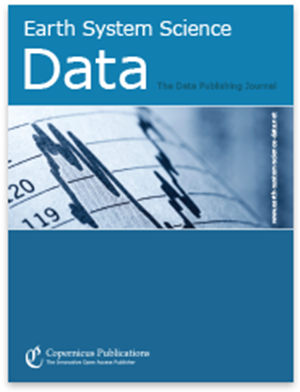2023 年全球气候变化指标:气候系统状况和人类影响的主要指标年度更新
IF 11.6
1区 地球科学
Q1 GEOSCIENCES, MULTIDISCIPLINARY
引用次数: 0
摘要
摘要政府间气候变化专门委员会(IPCC)的评估是根据《联合国气候变化框架公约》(UNFCCC)进行气候谈判的可靠科学证据来源。基于证据的决策需要了解气候系统状况和人类对全球气候系统影响的关键指标的最新和及时信息。然而,政府间气候变化专门委员会(IPCC)的连续报告每隔 5-10 年发布一次,这就有可能造成报告周期之间的信息空白。我们尽可能采用与 IPCC 第六次评估报告(AR6)第一工作组(WGI)报告相近的方法。我们汇编监测数据集,以估算与气候系统强迫有关的关键气候指标:温室气体和短期气候强迫的排放、温室气体浓度、辐射强迫、地球能量失衡、地表温度变化、人类活动导致的变暖、剩余碳预算以及全球极端温度估算。这项工作以开放数据、开放科学方法为基础,目的是在公共领域提供每年更新的可靠全球气候指标(https://doi.org/10.5281/zenodo.11064126, Smith et al., 2024a)。由于这些指标可追溯到 IPCC 报告的方法,因此可以得到参与《联合国气候变化框架公约》谈判各方的信任,并有助于更广泛地了解气候系统的最新知识及其发展方向。指标显示,就2014-2023年十年平均值而言,观测到的升温幅度为1.19 [1.06 至1.30] °C,其中1.19 [1.0 至1.4] °C是人为因素造成的。就单年平均值而言,相对于1850-1900年,2023年人类引起的变暖达到1.31 [1.1至1.7] °C。这低于2023年观测到的1.43[1.32至1.53]摄氏度的记录,表明在2023年的记录中,内部变率的作用很大。人类引起的变暖速度在仪器记录中是前所未有的,2014-2023 年达到每十年 0.26 [0.2-0.4] ℃。造成这种高速变暖的原因是温室气体排放量在过去十年中达到了每年 54 ± 5.4 GtCO2e 的历史新高,以及气溶胶冷却强度的降低。尽管如此,有证据表明,与 2000 年代相比,过去十年中二氧化碳排放量的增长速度已经放缓,根据社会的选择,在 2020 年代的关键十年中继续进行一系列年度更新,可能会使这里介绍的一些指标的方向发生变化。本文章由计算机程序翻译,如有差异,请以英文原文为准。
Indicators of Global Climate Change 2023: annual update of key indicators of the state of the climate system and human influence
Abstract. Intergovernmental Panel on Climate Change (IPCC) assessments are the trusted source of scientific evidence for climate negotiations taking place under the United Nations Framework Convention on Climate Change (UNFCCC). Evidence-based decision-making needs to be informed by up-to-date and timely information on key indicators of the state of the climate system and of the human influence on the global climate system. However, successive IPCC reports are published at intervals of 5–10 years, creating potential for an information gap between report cycles. We follow methods as close as possible to those used in the IPCC Sixth Assessment Report (AR6) Working Group One (WGI) report. We compile monitoring datasets to produce estimates for key climate indicators related to forcing of the climate system: emissions of greenhouse gases and short-lived climate forcers, greenhouse gas concentrations, radiative forcing, the Earth's energy imbalance, surface temperature changes, warming attributed to human activities, the remaining carbon budget, and estimates of global temperature extremes. The purpose of this effort, grounded in an open data, open science approach, is to make annually updated reliable global climate indicators available in the public domain (https://doi.org/10.5281/zenodo.11064126, Smith et al., 2024a). As they are traceable to IPCC report methods, they can be trusted by all parties involved in UNFCCC negotiations and help convey wider understanding of the latest knowledge of the climate system and its direction of travel. The indicators show that, for the 2014–2023 decade average, observed warming was 1.19 [1.06 to 1.30] °C, of which 1.19 [1.0 to 1.4] °C was human-induced. For the single year average, human-induced warming reached 1.31 [1.1 to 1.7] °C in 2023 relative to 1850–1900. This is below the 2023 observed record of 1.43 [1.32 to 1.53] °C, indicating a substantial contribution of internal variability in the 2023 record. Human-induced warming has been increasing at rate that is unprecedented in the instrumental record, reaching 0.26 [0.2–0.4] °C per decade over 2014–2023. This high rate of warming is caused by a combination of greenhouse gas emissions being at an all-time high of 54 ± 5.4 GtCO2e per year over the last decade, as well as reductions in the strength of aerosol cooling. Despite this, there is evidence that the rate of increase in CO2 emissions over the last decade has slowed compared to the 2000s, and depending on societal choices, a continued series of these annual updates over the critical 2020s decade could track a change of direction for some of the indicators presented here.
求助全文
通过发布文献求助,成功后即可免费获取论文全文。
去求助
来源期刊

Earth System Science Data
GEOSCIENCES, MULTIDISCIPLINARYMETEOROLOGY-METEOROLOGY & ATMOSPHERIC SCIENCES
CiteScore
18.00
自引率
5.30%
发文量
231
审稿时长
35 weeks
期刊介绍:
Earth System Science Data (ESSD) is an international, interdisciplinary journal that publishes articles on original research data in order to promote the reuse of high-quality data in the field of Earth system sciences. The journal welcomes submissions of original data or data collections that meet the required quality standards and have the potential to contribute to the goals of the journal. It includes sections dedicated to regular-length articles, brief communications (such as updates to existing data sets), commentaries, review articles, and special issues. ESSD is abstracted and indexed in several databases, including Science Citation Index Expanded, Current Contents/PCE, Scopus, ADS, CLOCKSS, CNKI, DOAJ, EBSCO, Gale/Cengage, GoOA (CAS), and Google Scholar, among others.
 求助内容:
求助内容: 应助结果提醒方式:
应助结果提醒方式:


